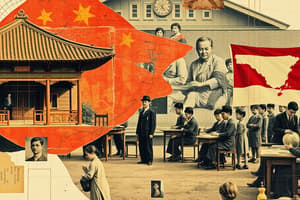Podcast
Questions and Answers
What is one of the primary goals of educational reforms?
What is one of the primary goals of educational reforms?
- Increasing class sizes to enhance learning
- Standardizing educational curricula across all countries
- Reducing parental involvement in education
- Improving student outcomes (correct)
How do families and communities contribute to educational success?
How do families and communities contribute to educational success?
- By limiting educational resources available to students
- By emphasizing competition among students
- Through parental involvement and supportive environments (correct)
- By focusing solely on academic achievement
What aspect of education is primarily focused on providing a foundation for lifelong learning?
What aspect of education is primarily focused on providing a foundation for lifelong learning?
- Higher education
- Adult education
- Secondary education
- Early childhood education (correct)
What ongoing challenge is highlighted in educational systems globally?
What ongoing challenge is highlighted in educational systems globally?
Which of the following is a characteristic of higher education?
Which of the following is a characteristic of higher education?
What is a primary focus of formal education?
What is a primary focus of formal education?
Which of the following best describes non-formal education?
Which of the following best describes non-formal education?
What is one of the key goals of educational systems?
What is one of the key goals of educational systems?
What role does effective teaching play in education?
What role does effective teaching play in education?
Which factor is a significant barrier to accessing quality education?
Which factor is a significant barrier to accessing quality education?
What is highlighted as a significant aspect of educational technology?
What is highlighted as a significant aspect of educational technology?
Which approach is necessary for addressing diverse learning needs?
Which approach is necessary for addressing diverse learning needs?
What historical factor contributed to broader access to education?
What historical factor contributed to broader access to education?
Flashcards
Educational Reforms
Educational Reforms
Changes made to education systems to improve student achievements, prepare teachers better, and keep up with changing societal needs.
Role of Families and Communities
Role of Families and Communities
The influence of parents and local communities on a child's education. It includes parental involvement, positive learning environments, and community support.
Early Childhood Education
Early Childhood Education
The first years of schooling provide foundations for future learning and development.
International Considerations
International Considerations
Signup and view all the flashcards
Ongoing Challenges
Ongoing Challenges
Signup and view all the flashcards
Informal Education
Informal Education
Signup and view all the flashcards
Formal Education
Formal Education
Signup and view all the flashcards
Non-formal Education
Non-formal Education
Signup and view all the flashcards
Curriculum
Curriculum
Signup and view all the flashcards
Assessment Methods
Assessment Methods
Signup and view all the flashcards
Individualized Approaches
Individualized Approaches
Signup and view all the flashcards
Educational Technology
Educational Technology
Signup and view all the flashcards
Equity in Education
Equity in Education
Signup and view all the flashcards
Study Notes
Historical Overview
- Education systems have evolved significantly across cultures and time periods.
- Early education focused on practical skills and cultural transmission within families and communities.
- Formal institutions gradually emerged, initially serving elites and religious orders.
- Industrialization and urbanization expanded educational access to more people.
Types of Education
- Formal education occurs in structured institutions (schools, colleges, universities) with curricula and assessments.
- Informal learning happens outside formal settings (families, communities, personal experiences).
- Non-formal learning takes place in organized settings lacking the structure and standardization of formal education. Often focused on specific skill development.
Goals of Education
- Education aims to develop knowledge, skills, and values.
- Key goals include critical thinking, problem-solving, communication, and collaboration.
- Cultural transmission and societal development are essential educational objectives.
Key Educational Concepts
- Curriculum design directly impacts learning outcomes.
- Effective teachers enhance student engagement and understanding.
- Diverse learning styles require personalized approaches and interventions.
- Assessment methods evaluate learning and provide feedback.
Access and Equity in Education
- Access to quality education is a global challenge.
- Socioeconomic status, location, and gender create educational disparities.
- Initiatives to promote equity aim for equal access and outcomes.
Educational Technology
- Educational technology rapidly improves learning experiences using digital tools.
- Technology allows for individualized learning paths and interactive engagement.
- Pedagogical strategies and implementation are crucial for effective technology use.
Educational Reforms
- Educational reforms address issues like student outcomes, teacher training, and changing societal needs.
- Innovations in teaching methods and curricula are significant reforms.
- Policy changes support the effective implementation of reforms.
The Role of Families and Communities
- Families and communities heavily influence educational paths.
- Parental involvement significantly impacts student success.
- Supportive communities create positive learning environments.
Specific Educational Levels
- Early childhood education lays a foundation for future learning and development.
- Primary and secondary education build fundamental knowledge and abilities.
- Higher education fosters critical thought, specialized knowledge, and professional growth.
- Adult education promotes continuous learning and skill development.
International Considerations
- Educational systems and policies vary across countries.
- International comparisons and collaborations show best practices and challenges.
Ongoing Challenges
- Adapting education to evolving knowledge and skills is ongoing.
- Globalization, technology, and social changes necessitate constant evaluation.
- Addressing inequalities and ensuring equal access to quality education is an ongoing priority.
Studying That Suits You
Use AI to generate personalized quizzes and flashcards to suit your learning preferences.




